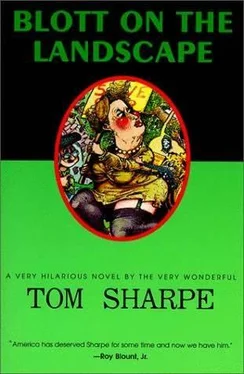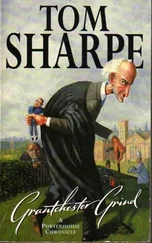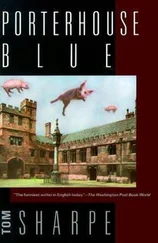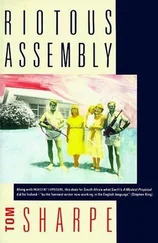Tom Sharpe - Blott on the Landscape
Здесь есть возможность читать онлайн «Tom Sharpe - Blott on the Landscape» весь текст электронной книги совершенно бесплатно (целиком полную версию без сокращений). В некоторых случаях можно слушать аудио, скачать через торрент в формате fb2 и присутствует краткое содержание. Жанр: Современная проза, на английском языке. Описание произведения, (предисловие) а так же отзывы посетителей доступны на портале библиотеки ЛибКат.
- Название:Blott on the Landscape
- Автор:
- Жанр:
- Год:неизвестен
- ISBN:нет данных
- Рейтинг книги:5 / 5. Голосов: 1
-
Избранное:Добавить в избранное
- Отзывы:
-
Ваша оценка:
- 100
- 1
- 2
- 3
- 4
- 5
Blott on the Landscape: краткое содержание, описание и аннотация
Предлагаем к чтению аннотацию, описание, краткое содержание или предисловие (зависит от того, что написал сам автор книги «Blott on the Landscape»). Если вы не нашли необходимую информацию о книге — напишите в комментариях, мы постараемся отыскать её.
Blott on the Landscape — читать онлайн бесплатно полную книгу (весь текст) целиком
Ниже представлен текст книги, разбитый по страницам. Система сохранения места последней прочитанной страницы, позволяет с удобством читать онлайн бесплатно книгу «Blott on the Landscape», без необходимости каждый раз заново искать на чём Вы остановились. Поставьте закладку, и сможете в любой момент перейти на страницу, на которой закончили чтение.
Интервал:
Закладка:
“Let me know what the blighter suggests,” said Sir Giles and went out to his car.
Chapter 7
To Dundridge, travelling up the M1, the underlying complexities of the situation in South Worfordshire were quite unknown. For the first time in his life he was armed with authority and he intended to put it to good use. He would make a name for himself. The years of frustration were over. He would return to London with his reputation for swift, decisive action firmly established.
At Warwick he stopped for lunch, and while he ate he studied the file on the motorway. There was a map of the district, the outline of the alternative routes, and a list of those people through whose property the motorway would run and the sums they would receive as compensation. Dundridge concentrated his attention on the latter. A single glance was enough to explain the urgency of his appointment and the difficulty of his mission. The list read like a roll-call of the upper class in the county. Sir Giles Lynchwood, General Burnett, Colonel Chapman, Mr Bullett-Finch, Miss Percival. Dundridge peered uncomfortably at the names and incredulously at the sums they were being offered. A quarter of a million pounds for Sir Giles. One hundred and fifty thousand to General Burnett. One hundred and twenty thousand to Colonel Chapman. Even Miss Percival whose occupation was listed as schoolteacher was offered fifty-five thousand. Dundridge compared these sums with his own income and felt a surge of envy. There was no justice in the world and Dundridge (whose socialism was embodied in the maxim “To each according to his abilities, from each according to his needs,” the “his” in both cases referring to Dundridge himself) found his thoughts wandering in the direction of money. It had been Dundridge’s mother who had instilled in him the saying “Don’t marry money, go where money is” and since this had been easier said than done, Dundridge’s sex life had been largely confined to his imagination. There, safe from the disagreeable complexities of real life, he had indulged his various passions. In his imagination Dundridge was rich, Dundridge was powerful and Dundridge was the possessor of an entourage of immaculate women – or to be precise of one woman, a composite creature made up of bits and pieces of real women who had once partially attracted him but without any of their concomitant disadvantages. Now for the first time he was going where money was. It was an alluring prospect. He finished his lunch and drove on.
And as he drove he became increasingly aware that the countryside had changed. He had left the motorway and was on a minor road that twisted and turned. The hedgerows grew taller and more rank. Hills rose up and fell away into empty valleys and woods took on a rougher, less domesticated air. Even the houses had lost the comfortable homogeneous look of the North London suburbs. They were either large and isolated, standing in their own grounds, or stone-built farmhouses surrounded by dark corrugated iron sheds and barns. Every now and again he passed through villages, strange conglomerations of cottages and shops, buildings that loomed mis-shapenly over the road or retreated behind hedges with an eccentricity of ornaments he found disturbing. And finally there were churches. Dundridge disliked churches most of all. They reminded him of death and burial, guilt and sin and the hereafter. Archaic reminders of a superstitious past. And since Dundridge lived if not for the present at least the immediate future, these memento mori held no attractions for him. They cast horrid doubts on the rational nature of existence. Not that Dundridge believed in reason. He placed his faith in science and numeration.
Now as he drove northwards he had to admit that he was entering a world far removed from his ideal. Even the sky had changed with the landscape and the shadows of large clouds slid erratically across the fields and hills. By the time he reached South Worfordshire he was distinctly perturbed. If Worford was anything like the surrounding countryside it must be a horrid place filled with violent, irrational creatures swayed by strange emotions. It was. As he drove over the bridge that spanned the Cleene he seemed to have moved out of the twentieth century into an earlier age. The houses below the town gate were huddled together higgledy-piggledy and only their scrubbed doorsteps redeemed their squalid lack of uniformity. The gate, a great stuccoed tower with a dark narrow entrance, loomed up before him. He drove nervously through and emerged into a street lined with eighteenth-century houses. Here he felt temporarily more at home but his relief evaporated when he reached the town centre. Dark narrow alleyways, half-timbered medieval houses jutting over the pavement, cobbled streets, and shopfronts which retained the format of an earlier age. Pots and pans, spades and sickles hung outside an ironmongers. Duffel coats, corduroy trousers and breeches were displayed outside an outfitters. A mackerel gleamed on a fishmonger’s marble slab while a saddler’s was adorned with bits and bridles and leather belts. Worford was in short a perfectly normal market town but to Dundridge, accustomed to the soothing anonymity of supermarkets, there was a disturbing, archaic quality about it. He drove into the Market Square and asked the car-park attendant for the Regional Planning Office. The attendant didn’t know or if he did, Dundridge was none the wiser. The accents of Wales and England met in South Worfordshire, met and mingled incomprehensibly. Dundridge parked his car and went into a telephone kiosk. He looked in the Directory and found the Planning Office in Knacker’s Yard.
“Where’s Knacker’s Yard?” he asked the car-park attendant.
“Down Giblet Walk.”
“Very informative,” said Dundridge with a shudder. “And Where’s Giblet Walk?”
“Well now, let’s see, you can go down past the Goat and Goblet or you can take a short cut through the Shambles,” said the old man and spat into the gutter.
Dundridge considered this unenticing alternative. “Where are the Shambles?” he asked finally.
“Behind you,” said the attendant.
Dundridge turned round and looked into the shadow of a narrow alley. It was cobbled and led down the hill and out of sight. He walked down it uncomfortably. Several of the houses were boarded up and one or two had actually fallen down and the alleyway had a peculiar smell that he associated with footpaths and tunnels under railway lines. Dundridge held his breath and hurried on and came out into Knacker’s Yard where a sign in front of a large red-brick building said Regional Planning Board. He opened an iron gate and went down a path to the door.
“Planning Board’s on the second floor,” said a dentist’s assistant who emerged from a room holding a metal bowl in which a pair of false teeth rested pinkly. “You’ll be lucky if you find it open though. You looking for anyone in particular?”
“Mr Hoskins,” said Dundridge.
“Try the Club,” said the woman. “He’s usually there this time of day. It’s on the first floor.”
“Thank you,” said Dundridge and went upstairs. On the first landing there was a door marked Worford and District Gladstone Club. Dundridge looked at it doubtfully and went on up. As the woman had said, the Regional Planning Board was shut. Dundridge went downstairs and stood uncertainly on the landing. Then, reminding himself that he was the Minister’s plenipotentiary and troubleshooter, he opened the door and looked inside.
“You looking for someone?” asked a large red-faced man who was standing beside a billiard table.
“I’m looking for Mr Hoskins, the Planning Officer,” said Dundridge. The red-faced man put down his cue and stepped forward.
“Then you’ve come to the right place,” he said. “Bob, there’s a bloke wants to see you.”
Читать дальшеИнтервал:
Закладка:
Похожие книги на «Blott on the Landscape»
Представляем Вашему вниманию похожие книги на «Blott on the Landscape» списком для выбора. Мы отобрали схожую по названию и смыслу литературу в надежде предоставить читателям больше вариантов отыскать новые, интересные, ещё непрочитанные произведения.
Обсуждение, отзывы о книге «Blott on the Landscape» и просто собственные мнения читателей. Оставьте ваши комментарии, напишите, что Вы думаете о произведении, его смысле или главных героях. Укажите что конкретно понравилось, а что нет, и почему Вы так считаете.












